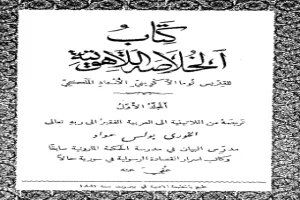Newly released
This book is new and will be uploaded as soon as it becomes available to us and if we secure the necessary publishing rights.

الخلاصة اللاهوتية للقديس توما الأكويني - المجلد الأول Book PDF
(0)
Author:
Thomas AquinasNumber Of Reads:
242
Language:
Arabic
Category:
ReligionsSection:
Pages:
612
Quality:
good
Views:
1479
Quate
Review
Save
Share
Book Description
Thomas Aquinas
Thomas Aquinas (Dominican monk) (1225 - 1274) was an Italian Catholic priest and saint of the Dominican Order, and an influential philosopher and theologian within the scholastic tradition. One of the thirty-three teachers of the Church, known as the angelic world (Doctor Angelicus) and the surrounding world (Doctor Universalis). He is usually referred to as Thomas, and Aquinas attributes it to his residence at Aquinas. He was one of the influential figures in natural theology, and is the father of the Thomistic school of philosophy and theology. His influence is wide on Western philosophy, and many of the ideas of modern Western philosophy are either a revolution against his ideas or an agreement with them, especially in matters of ethics, natural law and political theory. Aquinas is considered the ideal teacher for those studying to be priests in the Catholic Church. He is known by his operation as the epitome of divinity, creation, and the Creator. Many Christians consider him the Church's greatest philosopher, so many educational institutions are named after him.
Book Currently Unavailable
This book is currently unavailable for publication. We obtained it under a Creative Commons license, but the author or publisher has not granted permission to publish it.
Rate Now
5 Stars
4 Stars
3 Stars
2 Stars
1 Stars
الخلاصة اللاهوتية للقديس توما الأكويني - المجلد الأول Quotes
Top Rated
Latest
Quate
Be the first to leave a quote and earn 10 points
instead of 3
Comments
Be the first to leave a comment and earn 5 points
instead of 3